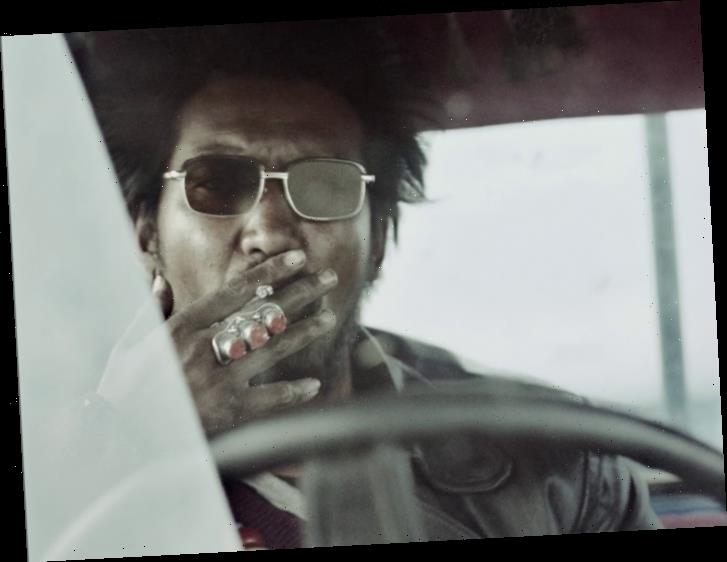After roaming for more than a year on the international festival circuit, “Jinpa” — the latest effort from Tibetan director Pema Tseden (“Old Dog,” “Tharlo”) — has finally launched a limited run in U.S. art houses, where it might find an appreciative if occasionally perplexed audience for its idiosyncratic mix of deadpan wit and understated mysticism. The movie is a dreamily austere shaggy-dog story that recalls the matter-of-fact absurdism of early Jim Jarmusch, yet at the same time generates a fair amount of suspense by repeatedly hinting at a potential for melodramatic upheaval. Ultimately, however, Tseden finds an audaciously different way to pull the rug out from under us.
Set in the rugged territory of the Kekexili Plateau, an isolated Tibetan region with an average elevation of more than 16,000 meters, “Jinpa” begins by introducing us to its title character, a grizzled long-distance trucker (played by an actor whose name also is Jinpa), as he traverses a seemingly endless road across a spectacularly barren landscape. He appears genuinely upset by the prospect of bad karma when he accidentally rolls over, and kills, a sheep. On the other hand, he seems only mildly nonplussed when, after picking up a hitchhiker (Genden Phuntsok) dressed in traditional attire, the taciturn young man reveals that he is journeying to Sanak, a small town along the way, to avenge his father’s long-ago murder by killing the man he holds responsible for the slaying.
Jinpa drops the hitchhiker off near his destination, then drives away to make his delivery. But he can’t stop thinking about this brief encounter. As it happens, the other man also is named Jinpa. Could their fates be somehow entwined? Should the trucker make amends for accidentally killing the sheep by preventing the deliberate spilling of blood?
Popular on Variety
Most of “Jinpa” the movie falls on the broad shoulders of Jinpa the actor, and he rises to the challenge by offering a gruffly charismatic performance with a Warren Oates vibe. His leather garb, spiky hair and perpetual scowl initially signal swaggering alpha maleness. (That he almost never takes off his sunglasses, and curtly dismisses any questions about his eyewear, is one of the movie’s drollest running gags.) But this tough customer entertains himself during long hauls with a cassette tape of his favorite opera aria — “O Sole Mio,” sung in Tibetan — and anxiously bribes a monk to offer a blessing for the sheep he killed “to guide its soul to the next life.”
Animals deserve such ceremony, Jinpa claims, “because they’re at different places in the wheel of life.” (Of course, as Tseden emphasizes with a touch of wink-wink irony, that doesn’t mean the trucker won’t partake of lamb he himself didn’t kill.) All of which suggests he is compelled to drive back to Sanak because of his deep religious beliefs. But then again, maybe not.
Based on “The Slayer,” a novel by Tsering Norbu, and Tseden’s own aptly titled short story “I Ran Over a Sheep,” “Jinpa” proceeds at a pace pitched somewhere between leisurely and glacial, which takes a while (but fortunately, not too long a while) getting used to. Right from the start, however, interest is piqued and maintained by the inventive compositions within the borders of Lu Songye’s 4:3 Academy ratio cinematography. The boxy framing proves suitably flexible to capture the unforgiving vastness of the Kekexili Plateau exteriors, the cramped confines of Jinpa’s truck — and the smoky environs of a tavern where Jinpa converses with a flirty waitress (a standout Sonam Wangmo) who insists that, yes, the labels may have fallen off the bottles, but the beer she’s selling really and truly is Budweiser.
‘Jinpa’: Film Review
Reviewed online, Houston, Feb. 23, 2020. Running time: 87 MIN. (Original title: “Zhuang si le yi zhi yang”)
Production:(China) An Icarus Films release (U.S.) of a Jet Tone Prods. production in association with Qinghai Mani Stone Pictures. Producers: Wong Kar-wai, Jacky Pang.
Crew:Director: Pema Tseden. Writer: Pema Tseden, based on “The Slayer,” by Tsering Norbu, and “I Ran Over a Sheep,” by Pema Tseden. Camera (color): Lu Songye. Editors: Jin Di, Chakdor Kyab. Music: Lim Giong & Point.
With:Jinpa, Genden Phuntsok, Sonam Wangmo. (Tibetan dialogue)
Source: Read Full Article
